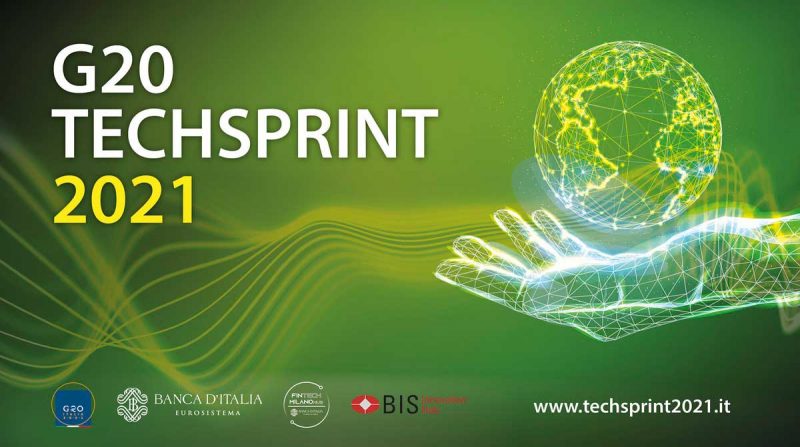On October 25th, the Bank for International Settlements (BIS) and the Bank of Italy announced the winners of the G20 TechSprint 2021 challenge during a live award ceremony in Milan. The G20 TechSprint 2021, a hackathon-style competition, was launched in May by the Italian G20 Presidency to highlight the potential for new technologies to resolve some of the most pressing challenges in green and sustainable finance.
An independent panel of 21 experts selected the most innovative solutions in each of the three categories:
- Team Greenomy from Belgium won the ‘Data collection, verification and sharing’ category for their solution ‘Greenomy,’ which offers a platform to screen and report green financing projects.
- Italy’s team CRIF and R.E.D. won the ‘Analysis and assessment of transition and physical climate-related risks’ category for their solution ‘Climate Risk Analytics Suite,’ which provides a digital platform for supporting institutions in monitoring and reporting climate risks consistent with international recommendations.
- Team Home Infrastructure Technology, from the U.K., won the ‘Better connecting projects and investors’ category for their solution ‘Add To My Mortgage’ to help financing more sustainable and green energy solutions in residential home renovations.
Deputy Governor of the Bank of Italy, Alessandra Perrazzelli, said: “The G20 TechSprint 2021 initiative engaged innovators worldwide to take up global and complex challenges in data collection, analysis of climate-related risks, and better connecting projects and investors. The three winning solutions show how technological innovations and finance can solve concrete problems creatively. The search for innovative technological solutions in the field of finance is in line with central banks’ traditional mission to safeguard monetary and financial stability by ensuring that the financial system operates in the best interests of the people and the whole economy.”
“This TechSprint has been instrumental in scanning the technological universe and in helping us refine the BIS Innovation Hub’s contribution to the green finance agenda,” said Benoît Cœuré, head of the BIS Innovation Hub. “The G20 TechSprint series have already proven to be a practical global forum for policy makers and technologists to collaborate on key areas of relevance to the regulatory and central banking community. We look forward to continuing this close cooperation,” he added.
Background
The world is facing significant challenges in its efforts to limit and reverse climate change and develop fair, inclusive and sustainable economies within single countries and across borders. Progress in addressing these challenges requires a collective effort, and government policies alone may be not enough. Policymakers are calling upon the entrepreneurial ingenuity of citizens, scientists, and changemakers to contribute to this change. Green and sustainable finance, together with social and governance dimensions (ESG), can contribute to allocating capital to projects that will reduce and reverse the environmental impact of air, land, and water pollution, climate change and loss of biodiversity. The search for innovative technological solutions in the field of finance is in line with the three key priorities, ‘People, Planet and Prosperity’ of Italy’s G20 Presidency.
Bank of Italy and the BIS Innovation Hub, together with submissions from G20 finance ministries and central banks, have identified three high-priority operational problems:
- Data collection, verification, and sharing
- Analysis and assessment of transition and physical climate-related risks
- Better connecting projects and investors
Bank of Italy set the total prize money at €360,000: each of the three winning teams will receive a cash prize of €50,000, while the 21 shortlisted teams received a prize of €10,000, regardless of the team’s size. The three winners will be fast-tracked into the Monetary Authority of Singapore Global Fintech Hackcelerator finals and will showcase their solutions during the Singapore FinTech Festival in November and receive an additional S$20,000 stipend.
Source: BIS



